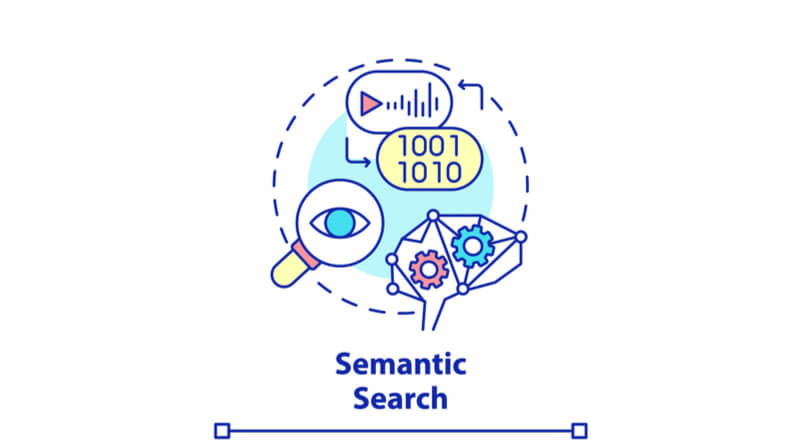In our modern world today, technology has become so advanced and integrated into our lives that we now rely on it for just about everything. From the moment we wake up to the time we go to bed, we’re constantly interacting with some form of technology.
So if you’re ready to learn more about this cutting-edge technology, let’s get started!
What is Semantic Search?
Semantic search is a type of technology that helps make search results more accurate and relevant to the user. It does this by taking into account the context and meaning of the search query, rather than just the individual keywords.
In other words, with the semantic search, you’re not just getting results based on a list of keywords, but results that actually match your intent and what you’re looking for.
This is in contrast to traditional search engines, which simply look at the individual keywords in a query and return results that contain those same keywords.
How Does Semantic Search Work?
Now that we know what semantic search is, let’s take a look at how it works.
As we mentioned, traditional search engines simply look at the individual keywords in a query and return results that contain those same keywords. This can often lead to irrelevant or even inaccurate results.
Semantic search, on the other hand, takes into account the context and meaning of the query as a whole. It looks at things like word order, synonyms, and related concepts to better understand the user’s intent.
This allows it to return results that are far more relevant and accurate than those from a traditional search engine.

Why is Semantic Search Important?
We’ve talked about what semantic search is and how it works, but why is it so important?
Well, there are a few reasons.
First of all, as the world becomes more digital, the amount of information available online is constantly increasing. This can make it very difficult to find the specific piece of information you’re looking for.
Semantic search can help with this by understanding the context and meaning of your query, and then returning results that are relevant to what you’re actually looking for.
Secondly, traditional search engines often return a lot of irrelevant results. This not only wastes your time, but it can also be frustrating. Semantic search can help reduce the number of irrelevant results by better understanding your query and returning only the most relevant results.
Finally, semantic search is constantly improving as technology advances. This means that it will continue to get better at understanding queries and returning more accurate results.
The History of Semantic Search
Semantic search is a relatively new technology, but it actually has a long history.
The Knowledge Graph
The history of semantic search started in 2012 with the launch of Google’s Knowledge Graph.
The Knowledge Graph is a database that contains information about real-world entities like people, places, and things. It’s used to understand the relationships between these entities and return more relevant results for queries.
For example, if you search for “Barack Obama,” the Knowledge Graph will display information about him, as well as related entities like his wife, children, and the country he was president of.
Hummingbird
In 2013, Google launched an update to its algorithm called Hummingbird.
Hummingbird was designed to better understand the meaning and intent behind queries. It did this by looking at the context and relationship between words, rather than just the individual words themselves.
This was a major update for Google, and it laid the foundation for semantic search.
RankBrain
In 2015, Google launched another major update called RankBrain.
RankBrain is a machine learning system that’s used to interpret and process queries. It’s constantly learning and evolving, which means it gets better and better at understanding the user’s intent over time.
This is a major step forward for semantic search, as it means that Google is constantly getting better at understanding queries and returning more relevant results.
RankBrain is just one part of Google’s overall algorithm, but it’s a very important one. In fact, Google has said that RankBrain is now the third most important factor in its algorithm, after content and links.
Moreover, RankBrain works by constantly learning and evolving. It does this by taking the queries it doesn’t understand and then finding similar queries that it does understand.
This allows it to better interpret and process queries over time, which results in more relevant and accurate results.
BERT
Lastly, we have BERT.
BERT is a machine learning system that’s used to understand the context and meaning of queries. It was launched in late 2019, and it’s currently the most important part of Google’s algorithm.
BERT is different from other machine learning systems because it uses a technique called “pre-training.” This means that it’s trained on a large amount of data before it’s deployed.
This allows BERT to better understand the context and meaning of queries, which results in more relevant and accurate results.
How To Optimize Your Content for Semantic Search

Now that we know what semantic search is and how it works, let’s take a look at how you can optimize your content for semantic search.
- The first thing you need to do is focus on creating high-quality content. This means content that’s well-written, informative, and relevant to your audience.
- Additionally, your content needs to be optimized for the right keywords. This means using the keywords that your audience is actually searching for. You can use tools like Google Keyword Planner and Google Trends to research the right keywords to use.
- Finally, you need to make sure your website is structured properly. This includes having a clear hierarchy and using a proper markup language. This will help Google understand the relationship between your pages and return more relevant results for queries.
Relevance of Semantic Search for SEO
Semantic search is a major factor in Google’s algorithm, and it’s only going to become more important in the future.
This means that if you want your website to rank well on Google, you need to optimize your content for semantic search.
The good news is that optimizing for semantic search is relatively simple. Just focus on creating high-quality, keyword-optimized content, and make sure your website is structured properly.
If you do this, you’ll be well on your way to ranking well on Google and getting more traffic to your website.
How to Make Your Website More Relevant to Google

There are a few ways you can make your website easier to understand by Google.
Here are some tips you can do to start:
1. Use keyword-rich titles and descriptions
Titles and meta descriptions matter as much as ever. Make sure you’re using relevant keywords in both, so Google can easily understand what your website is about.
2. Use keyword-rich headings and subheadings
Headings and subheadings help break up your content and make it easier to read. They also give Google another opportunity to see your relevant keywords.
3. Optimize your images with keywords
Google can’t read images, so you need to optimize them with alternative text (ALT text). This is a short description of the image that includes relevant keywords.
4. Use structured data markup
Structured data markup is code that helps Google understand the content on your website. It’s especially important for eCommerce websites.
5. Publish fresh content regularly
Google loves fresh content. If you want your website to be relevant, you need to publish new articles, blog posts, or product pages on a regular basis.
6. Make an excellent link-building strategy
Link building is the process of getting links from other websites. Google sees links as votes, so the more votes your website has, the more relevant it will be.
7. Optimize for mobile devices
Mobile optimization is crucial in today’s world. Google gives preference to websites that are mobile-friendly, so make sure yours is responsive and easy to use on a smartphone or tablet.
8. Improve your website’s speed
Google wants its users to have a good experience, so it favors websites that load quickly. If your website is slow, work on improving your page speed.
9. Use social media to your advantage
Social media can help improve your website’s relevance because it’s another way to get links and generate traffic. Make sure you’re active on social media and sharing your content regularly.
10. Monitor your website’s performance
The only way to know if your efforts are paying off is to track your progress. Google Analytics is a free tool that can help you do this.
By following these tips, you can make your website more relevant to Google and improve your chances of ranking well in the search results.
Focus on User Experience
Semantic search and SEO are important, but at the end of the day, Google wants to deliver the best possible results to its users.
This means that you need to focus on creating a good user experience for your website.
Some ways you can do this include:
- Creating high-quality content
- Make sure your website is easy to navigate and use
- Ensuring your website loads quickly
- Optimizing your website for mobile devices
- Providing customer service and support
Keep in mind that user experience is highly crucial these days. In fact, Google now uses it as a ranking factor.
So, if you want your website to rank well, you need to make sure it’s providing an excellent experience to users.
The Future of Semantic Search
Semantic search is constantly evolving, and it’s only going to get better as time goes on.
As we mentioned, Google’s RankBrain system is constantly learning and evolving. This means that it will continue to get better at understanding queries and returning more relevant results.
In addition, other companies are also investing in semantic search. For example, Microsoft has launched its own semantic search engine called Satori. Satori is used to power Bing’s search results, and it’s constantly getting better at understanding queries and returning more relevant results.
As semantic search technology continues to improve, it’s likely that we’ll see more and more companies adopt it. This will result in more accurate and relevant search results for everyone.
Start Doing Semantic Search Today!
In conclusion, semantic search is a major part of Google’s algorithm, and it’s important to optimize your content for it.
To do this, you need to focus on creating high-quality content that’s well-written, informative, and relevant to your audience. Additionally, you need to make sure your website is structured properly and uses the right keywords.
We at Lead Origin offer affordable SEO packages to our customers. We also offer semantic search engine optimization (SEO) services. You can learn more about our SEO packages by visiting our website or contacting us today.
With Lead Origin’s semantic SEO services, you can rest assured that your website will be optimized for the right keywords and return more relevant results for queries. Contact us today to learn more about our semantic SEO services.


